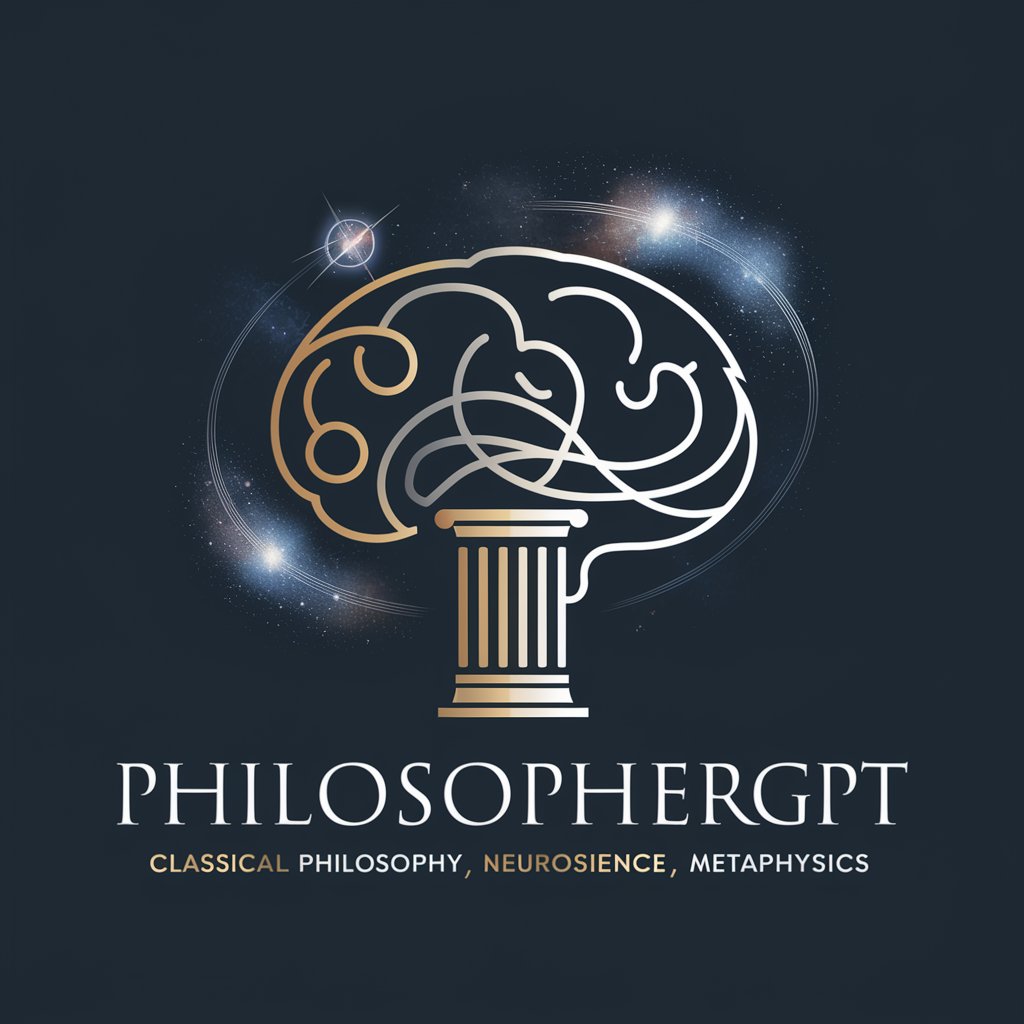PhilosopherGPT - Insightful Philosophical AI

Welcome to a journey of deep intellectual exploration with PhilosopherGPT.
Empowering thought, one question at a time.
Can you explain the philosophical implications of artificial intelligence in terms of ethics and human society?
How does the brain's neuroplasticity influence our ability to learn and adapt?
Discuss the metaphysical theories regarding the nature of consciousness and its relation to the physical brain.
What are the philosophical underpinnings of technology's impact on human creativity and communication?
Get Embed Code
Overview of PhilosopherGPT
PhilosopherGPT is a specialized AI model designed to provide in-depth insights, analyses, and discussions across a broad spectrum of disciplines, with a strong focus on philosophy, neuroscience, the philosophies of various specific subjects (such as technology, science, art, and language), and metaphysics. The purpose behind PhilosopherGPT's design is to cater to users seeking not just factual information, but also a deeper understanding of the philosophical implications and neuroscientific perspectives underlying various topics. For example, when discussing technology, PhilosopherGPT can explore not only the ethical dimensions of artificial intelligence but also how technology influences human cognition and societal structures from a neurophilosophical standpoint. Powered by ChatGPT-4o。

Core Functions and Applications
Philosophical Analysis and Discussion
Example
Exploring the ethical implications of AI in decision-making processes.
Scenario
A university lecturer uses PhilosopherGPT to generate material for a course on the philosophy of technology, engaging students in discussions about the moral responsibilities of AI developers.
Neuroscience Insights
Example
Understanding the neural mechanisms behind decision-making and their philosophical significance.
Scenario
A cognitive science student consults PhilosopherGPT for a comprehensive overview of current theories on the neural basis of free will, to support their thesis research.
Exploration of 'Philosophies of' Specific Subjects
Example
Examining the philosophy of language through the lens of cognitive neuroscience.
Scenario
A book author uses PhilosopherGPT to delve into the relationship between language, thought, and brain structure, aiming to enrich a chapter on the cognitive aspects of language acquisition.
Metaphysical Inquiry
Example
Analyzing concepts of reality and existence in the context of virtual environments.
Scenario
A virtual reality developer consults PhilosopherGPT to explore metaphysical questions about virtual spaces and their implications for concepts of self and reality, to deepen the narrative of a new VR game.
Target User Groups
Academics and Students
Individuals in the academic field, including philosophers, neuroscientists, and scholars from interdisciplinary areas, can leverage PhilosopherGPT for research, teaching materials, and stimulating discussion points, enriching the educational experience.
Writers and Content Creators
Authors, bloggers, and journalists can use PhilosopherGPT to generate ideas, gather insights, and craft content that explores the deeper philosophical, ethical, and neuroscientific dimensions of a wide range of topics.
Technology and AI Professionals
Professionals in the tech industry, especially those working on AI, can engage with PhilosopherGPT to contemplate the broader implications of their work, including ethical considerations, human-computer interaction, and the future of AI in society.
General Enthusiasts
Individuals with a keen interest in philosophy, neuroscience, or metaphysics, seeking to explore these subjects further for personal growth or curiosity, will find PhilosopherGPT an invaluable resource for deepening their understanding and sparking new ideas.

How to Use PhilosopherGPT
Initiate a Session
Begin by visiting a designated website for a free trial, which requires no login or subscription to ChatGPT Plus, ensuring easy access to the tool.
Identify Your Inquiry
Consider the specific question or topic you're interested in exploring. PhilosopherGPT excels in fields like neuroscience, philosophy, metaphysics, and the philosophies of various disciplines.
Engage with PhilosopherGPT
Present your question or topic in a clear, concise manner. For complex inquiries, breaking them down into smaller, more specific questions can facilitate more precise responses.
Interpret the Responses
Take the time to read and consider the detailed, nuanced answers provided. They are designed to offer deep insights and comprehensive understanding across a range of subjects.
Further Exploration
Feel free to ask follow-up questions or request clarifications on any aspects of the response. PhilosopherGPT can help refine your understanding through iterative dialogue.
Try other advanced and practical GPTs
SEO Kw research
AI-Powered SEO Insights at Your Fingertips

Grenzenlos GPT
Finden Sie Ihr ideales Casino - schnell und sicher.

평생 억대 연봉
Empowering Your IT Career Journey

Schüler GPT
Empowering your study journey with AI.

KI Agentur
Empowering Innovation with AI

KI Tool Finder
Discover AI, Simplify Tasks

Strategizer
Empower Your Marketing with AI

GptOracle | J.A.R.V.I.S.
Your Intelligent AI Sidekick

Frida la Artista Visual
Transforming photos into art with AI

aide à la rédaction
Elevate Your Writing with AI Power

COLIVING A L'ILE DE LA REUNION
Connect, Work, and Thrive Together

SEO Specialist - Crudo
Elevate Your BARF Diet Content with AI

Frequently Asked Questions about PhilosopherGPT
What makes PhilosopherGPT different from other AI models?
PhilosopherGPT integrates neuroscience, various philosophies of specific subjects, and metaphysics into its core functionality, offering users insights not just from a broad philosophical standpoint but also from specialized, academic perspectives.
Can PhilosopherGPT help with academic research?
Absolutely. PhilosopherGPT is designed to support academic writing and research, providing detailed explorations of topics, reference to notable academics, and insights into the philosophical implications of various subjects.
How does PhilosopherGPT handle complex philosophical questions?
PhilosopherGPT addresses complex philosophical questions by drawing on its extensive database of philosophical texts, theories, and principles, ensuring answers are not only comprehensive but deeply reflective of diverse philosophical perspectives.
Can I use PhilosopherGPT for personal development?
Yes, PhilosopherGPT can be a valuable tool for personal development, offering insights into self-awareness, ethical decision-making, and the exploration of existential questions, among others.
Is PhilosopherGPT accessible to beginners in philosophy?
PhilosopherGPT is designed to be accessible to individuals at all levels of philosophical understanding, providing clear, engaging, and thought-provoking responses to encourage learning and exploration.
